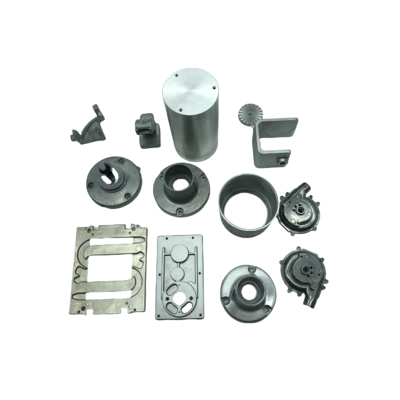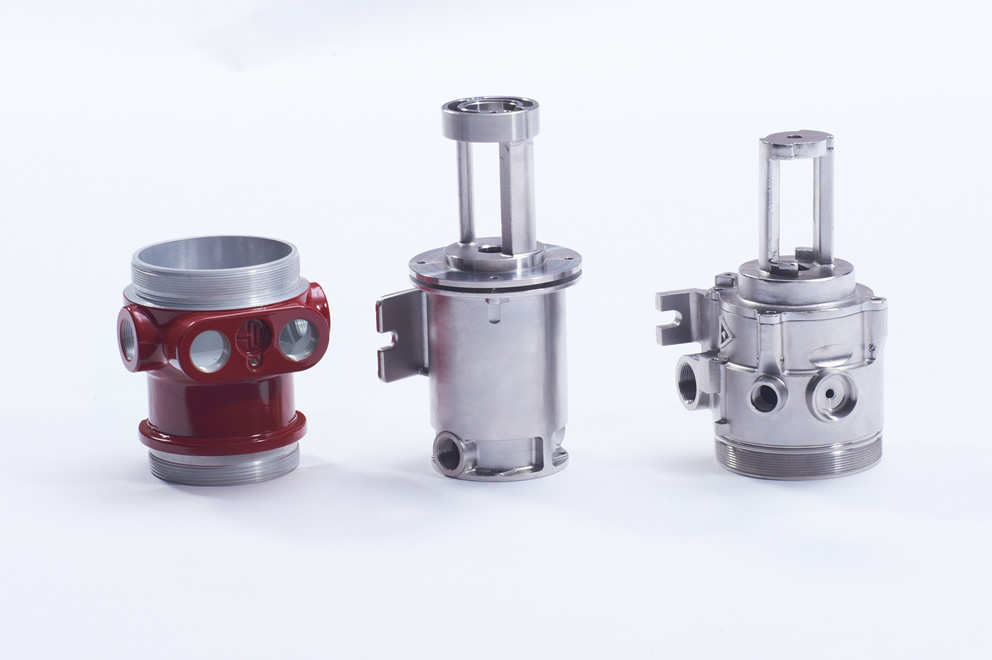Exploring the steps behind successful Precision aluminum casting
Wiki Article
The Future of Light Weight Aluminum Foundries: Technologies and patterns Forming the Industry
The aluminum foundry market is going through significant improvement. Secret patterns highlight the value of sustainability and effectiveness. Technologies in wise production and automation are coming to be prevalent. Factories are progressively focused on making use of recycled materials. This change raises questions concerning future techniques and innovations. Just how will these changes effect manufacturing approaches and market dynamics? The responses might redefine the market landscape in unforeseen ways.Improvements in Smart Production Technologies
As the aluminum factory sector evolves, innovations in smart production modern technologies are becoming progressively important for boosting performance and effectiveness. The assimilation of automation, expert system, and the Web of Points (IoT) is changing traditional factory procedures. These modern technologies allow real-time tracking of processes, enabling prompt changes that enhance outcome and decrease waste.Device discovering algorithms evaluate production data to identify patterns and predict maintenance demands, decreasing downtime. Robotics are progressively utilized for repetitive tasks, releasing experienced workers to focus on even more complex obstacles. In addition, electronic twins-- digital designs of physical processes-- promote simulations that can enhance design and operational strategies.
The fostering of these clever production technologies is driving affordable benefits in the aluminum factory field. By streamlining operations and enhancing decision-making capabilities, shops can satisfy growing market needs while preserving top notch requirements. The future of light weight aluminum factories is undeniably connected to these technological innovations.
Embracing Eco-Friendly Materials and Processes
The light weight aluminum factory sector is progressively concentrating on eco-friendly products and processes to improve sustainability. This change includes the fostering of lasting product sourcing, energy-efficient manufacturing techniques, and reliable recycling and waste management approaches. By integrating these techniques, foundries intend to reduce their environmental impact while keeping competitiveness in the market.Lasting Product Sourcing
Exactly how can light weight aluminum foundries improve their sustainability initiatives? Sustainable material sourcing has actually arised as an important technique in achieving this goal. By focusing on recycled light weight aluminum, factories can greatly reduce their environmental footprint, as recycled materials need much less power and fewer resources compared to main aluminum manufacturing. Furthermore, sourcing products from licensed distributors that stick to eco-friendly practices promotes accountable mining and decreases ecological impact. Factories are likewise checking out different materials, such as biopolymers and environmentally friendly coverings, to complement traditional aluminum procedures. Teaming up with stakeholders, including distributors and environmental organizations, fosters innovation in sourcing approaches. Eventually, welcoming sustainable material sourcing not just straightens with global sustainability goals however likewise settings aluminum foundries as leaders in ecologically liable manufacturing.Energy-Efficient Manufacturing Strategies
Aluminum foundries are increasingly adopting energy-efficient manufacturing strategies to match their sustainable material sourcing campaigns. These methods concentrate on lessening energy intake throughout the manufacturing procedure. Advanced innovations, such as induction melting and optimized spreading processes, are being executed to reduce the total carbon impact. Furthermore, automation and smart production systems boost functional performance, enabling far better power administration. Foundries are additionally discovering the combination of renewable resource resources, such as solar and wind, to power their operations. By focusing on energy effectiveness, aluminum shops not only reduced production prices however also straighten themselves with global sustainability objectives, guaranteeing a much more environmentally responsible technique to light weight aluminum manufacturing while fulfilling the rising demand for eco-friendly methods in the market.Reusing and Waste Management
Embracing eco-friendly products and procedures, aluminum factories are focusing on recycling and waste administration approaches to improve sustainability in their procedures. By incorporating closed-loop systems, these centers are minimizing waste and maximizing resource effectiveness. Scrap aluminum, a conveniently available material, is being reused on-site, greatly decreasing the demand for virgin products and decreasing power consumption. Developments in arranging and refining modern technologies additionally assist in the recycling of aluminum, ensuring that also contaminated materials can be repurposed efficiently. Furthermore, foundries are adopting lasting techniques such as minimizing hazardous waste and promoting the use of eco-friendly products for product packaging. This dedication to reusing not only lowers environmental influence yet additionally improves the financial practicality of light weight aluminum shops in an affordable market.The Duty of Automation and Robotics
Automation and robotics are increasingly transforming the aluminum factory market, considerably enhancing production efficiency. By incorporating advanced technologies, foundries can reduce labor prices while simultaneously improving safety and security standards for their workforce. This change not only streamlines procedures however also places the sector for lasting growth in a competitive market.Enhanced Manufacturing Effectiveness
Reinventing production procedures, the combination of advanced robotics and automation innovations has come to be a cornerstone for light weight aluminum factories looking for improved performance. These developments simplify process, reduce cycle times, and enhance item quality by decreasing human mistake. Automated systems can keep track of manufacturing lines in real-time, enabling for immediate changes that optimize result. Additionally, robotics help with the handling of hazardous products, guaranteeing more secure working settings while boosting throughput. Anticipating maintenance modern technologies also add to efficiency by preparing for equipment failings, thus lowering downtime. Consequently, light weight aluminum shops can accomplish higher consistency in their products while reacting extra quickly to market needs. This welcome of automation is setting a brand-new standard for efficiency and operational quality within the sector.
Lowering Labor Prices
The shift towards advanced robotics and automation in aluminum factories not only improves production effectiveness however likewise plays a significant duty in decreasing labor expenses. By integrating automated systems, shops can decrease the dependence on manual labor, which commonly entails high incomes and training expenditures. Robotics enhance repeated jobs such as putting, molding, and completing, permitting for a higher outcome with fewer employees. This technical change not only decreases labor-related expenses however likewise boosts consistency and top quality in manufacturing. Automation can operate around the clock, taking full advantage of functional hours without the linked prices of overtime or shift differentials. As an outcome, light weight aluminum shops can attain significant savings while preserving competitive pricing in a developing market landscape.Improving Security Standards
While standard light weight aluminum foundry procedures typically expose workers to unsafe settings, the integration of robotics and automation greatly improves safety criteria within the market. Automated systems can execute high-risk jobs, such as molten steel handling and heavy training, reducing human direct exposure to harmful conditions. Furthermore, robotics can run in severe temperature levels and harmful ambiences, successfully lessening the threat of injury. Advanced keeping an eye on technologies and fabricated intelligence assurance real-time safety assessments, enabling immediate actions to possible risks. Automation enhances operations, reducing the possibility of crashes created by human error. Because of this, the fostering of these modern technologies not only enhances security yet additionally cultivates a much more effective and efficient workplace in light weight aluminum foundries.Enhancing Energy Efficiency in Production
As aluminum shops look for to keep competition in an advancing market, improving energy performance in manufacturing has arised as an important emphasis. By taking on innovative modern technologies such as high-efficiency melting heaters and automated temperature level controls, shops can significantly decrease power usage. Carrying out real-time tracking systems permits accurate tracking of power usage throughout the production process, enabling fast changes to enhance effectiveness.Furthermore, shifting to different power resources, including sustainable choices, can further lower the carbon impact. The integration of power healing systems, which reclaim waste warm for reuse, is ending up being progressively common. Educating personnel in power administration practices assures that everyone entailed in the production procedure is conscious of energy use.
this link These initiatives not just lower functional costs yet likewise straighten with worldwide sustainability goals, placing aluminum factories as responsible players in the sector while boosting their total competitiveness. - aluminum casting
Advancements in Recycling Light Weight Aluminum
Advancements in recycling aluminum have acquired energy alongside initiatives to enhance energy you can try here effectiveness in manufacturing. The aluminum market has actually embraced sophisticated technologies that enhance the reusing process, minimizing energy usage and ecological impact. Methods such as hydrometallurgy and brand-new sorting modern technologies improve the extraction of light weight aluminum from scrap, boosting yield rates and making certain better recycled product.
Moreover, the development of closed-loop recycling systems enables shops to recycle aluminum without considerable destruction in quality, making the procedure much more lasting. Innovations in logistics and collection, including improved radar and automated sorting, have actually additionally played an essential duty in increasing the efficiency of light weight aluminum recuperation. These advancements not just add to a round economic situation yet additionally help minimize the carbon impact related to light weight aluminum production. As the demand for sustainable techniques expands, these advancements place the aluminum foundry field as a leader in liable source administration.
Replying To Market Needs and Customer Trends
Adaptability has actually ended up being a foundation for aluminum shops reacting to advancing market demands and consumer fads. As markets progressively prioritize sustainability, light weight aluminum foundries are changing in the direction of green methods, including improved reusing procedures and minimized carbon footprints. This change aligns with customer preferences for eco responsible items, driving foundries to innovate their offerings.Additionally, the increase of lightweight products in vehicle and aerospace industries demands improvements in light weight aluminum alloys and casting techniques. Factories are purchasing research study and growth to create high-strength, light-weight elements that meet rigorous performance requirements.
Customization has obtained traction, with consumers looking for tailored options. Aluminum foundries are leveraging innovative production innovations, such as 3D printing, to accommodate certain customer demands effectively. This responsiveness not just pleases consumer demands however additionally settings light weight aluminum factories competitively in a vibrant market landscape, guaranteeing their significance in an ever-changing commercial setting.

Regularly Asked Inquiries
How Do Aluminum Foundries Impact Local Economies?
Aluminum shops considerably influence neighborhood economic situations by developing work, promoting demand for local suppliers, and adding to neighborhood development. Their operations frequently lead to raised tax obligation profits, which can money necessary civil services and facilities enhancements.What Are the Security Laws for Aluminum Shop Workers?
Safety laws for light weight aluminum factory employees include obligatory personal safety devices, proper air flow systems, regular training on unsafe products, and adherence to guidelines established by work-related health and wellness managements to reduce risks and warranty employee safety and security. - Aluminum FoundryExactly How Does Aluminum Recycling Affect Global Supply Chains?
Aluminum reusing significantly lowers demand for basic materials, improves source efficiency, and maintains prices. This change influences worldwide supply chains by promoting a round economy, advertising sustainability, and ensuring straight from the source a much more resistant industry in changing markets.What Career Opportunities Exist in the Aluminum Foundry Market?
Different occupation chances exist in the light weight aluminum shop industry, consisting of roles in engineering, high quality control, manufacturing monitoring, and research and development. Competent labor positions such as mold makers and machine operators are likewise sought after.Just How Do International Trade Policies Influence Light Weight Aluminum Foundries?
International trade policies substantially impact aluminum factories by impacting import tolls, supply chain characteristics, and market accessibility. These factors can influence operational expenses, competitiveness, and general earnings within the international light weight aluminum production landscape.By focusing on recycled light weight aluminum, shops can considerably reduce their ecological impact, as recycled products call for much less energy and less sources contrasted to main aluminum production. Aluminum foundries are increasingly adopting energy-efficient manufacturing strategies to enhance their lasting material sourcing efforts. Automation and robotics are increasingly transforming the light weight aluminum foundry market, considerably boosting production effectiveness. The shift towards advanced robotics and automation in aluminum shops not just enhances manufacturing performance yet additionally plays a significant duty in lowering labor expenses. As aluminum foundries look for to preserve competitiveness in a developing market, enhancing power effectiveness in production has actually emerged as a crucial emphasis.
Report this wiki page